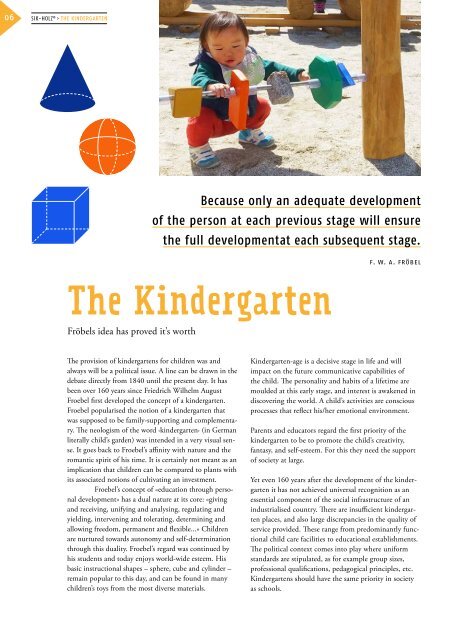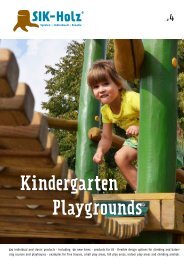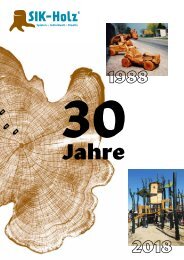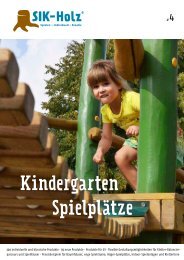Kindergarten Playgrounds
Kindergarten Playgrounds
Kindergarten Playgrounds
Create successful ePaper yourself
Turn your PDF publications into a flip-book with our unique Google optimized e-Paper software.
06<br />
SIK-Holz® › The <strong>Kindergarten</strong><br />
Because only an adequate development<br />
of the person at each previous stage will ensure<br />
the full developmentat each subsequent stage.<br />
f. w. a. fröbel<br />
The <strong>Kindergarten</strong><br />
Fröbels idea has proved it’s worth<br />
The provision of kindergartens for children was and<br />
always will be a political issue. A line can be drawn in the<br />
debate directly from 1840 until the present day. It has<br />
been over 160 years since Friedrich Wilhelm August<br />
Froebel first developed the concept of a kindergarten.<br />
Froebel popularised the notion of a kindergarten that<br />
was supposed to be family-supporting and complementary.<br />
The neologism of the word ‹kindergarten› (in German<br />
literally child’s garden) was intended in a very visual sense.<br />
It goes back to Froebel’s affinity with nature and the<br />
romantic spirit of his time. It is certainly not meant as an<br />
implication that children can be compared to plants with<br />
its associated notions of cultivating an investment.<br />
Froebel’s concept of «education through personal<br />
development» has a dual nature at its core: «giving<br />
and receiving, unifying and analysing, regulating and<br />
yielding, intervening and tolerating, determining and<br />
allowing freedom, permanent and flexible...» Children<br />
are nurtured towards autonomy and self-determination<br />
through this duality. Froebel’s regard was continued by<br />
his students and today enjoys world-wide esteem. His<br />
basic instructional shapes – sphere, cube and cylinder –<br />
remain popular to this day, and can be found in many<br />
children’s toys from the most diverse materials.<br />
<strong>Kindergarten</strong>-age is a decisive stage in life and will<br />
impact on the future communicative capabilities of<br />
the child. The personality and habits of a lifetime are<br />
moulded at this early stage, and interest is awakened in<br />
discovering the world. A child’s activities are conscious<br />
processes that reflect his/her emotional environment.<br />
Parents and educators regard the first priority of the<br />
kindergarten to be to promote the child’s creativity,<br />
fantasy, and self-esteem. For this they need the support<br />
of society at large.<br />
Yet even 160 years after the development of the kindergarten<br />
it has not achieved universal recognition as an<br />
essential component of the social infrastructure of an<br />
industrialised country. There are insufficient kindergarten<br />
places, and also large discrepancies in the quality of<br />
service provided. These range from predominantly functional<br />
child care facilities to educational establishments.<br />
The political context comes into play where uniform<br />
standards are stipulated, as for example group sizes,<br />
professional qualifications, pedagogical principles, etc.<br />
<strong>Kindergarten</strong>s should have the same priority in society<br />
as schools.














